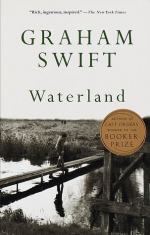|
This section contains 276 words (approx. 1 page at 400 words per page) |

|
Waterland Summary & Study Guide Description
Waterland Summary & Study Guide includes comprehensive information and analysis to help you understand the book. This study guide contains the following sections:
This detailed literature summary also contains Bibliography and a Free Quiz on Waterland by Graham Swift.
British novelist Graham Swift's Waterland (London, 1983; New York, 1984) is a complex tale set in eastern England's low-lying fens region. It is narrated by Tom Crick, a middle-aged history teacher. Tom is facing a personal crisis, since he is about to be laid off from his job and his wife has been admitted to a mental hospital. He is a man who is keenly interested in ideas about the nature and purpose of history. Faced with a class of bored and rebellious students, he scraps the traditional history curriculum and tells them stories of the fens instead. These stories form the substance of the novel, which takes place mainly in two time frames: the present, and the year 1943, when Tom Crick is fifteen years old. The traumatic events of his adolescence reach forward in time to influence the present. The structure of the novel, which frequently moves back and forth in time, also suggests the fluidity of the interaction between past and present.
Tom's tale of the fens is sometimes lurid. It includes a family history going back to the eighteenth century and such lurid topics as murder, suicide, abortion, incest, and madness. These events are set against a background of some of the great events in history, such as World War I and World War II. The novel also includes digressions on such off-beat topics as the sex life of the eel, the history of land reclamation, the history of the River Ouse, and the nature of phlegm. At once a philosophical meditation on the meaning of history and a gothic family saga, Waterland is a tightly interwoven novel that entertains as it provokes.
Read more from the Study Guide
|
This section contains 276 words (approx. 1 page at 400 words per page) |

|



